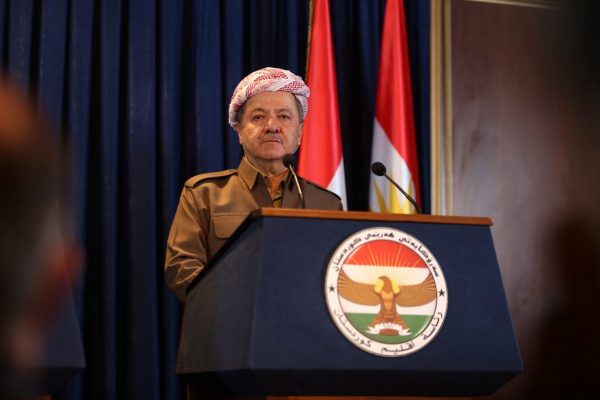
Adressing a rally in support of the vote in Erbil, the seat of the KRG, Barzani reacted to a United Nations Security Council statement that expressed on Thursday concern over the potential destabilising impact of the vote on Iraq.
Neighbouring countries and Western powers fear the vote could break up the country and stir broader regional ethnic and sectarian conflict. Turkey is holding army border exercises to underline its concerns Iraqi Kurdish separatism could feed insurrection on its soil.
Turkish Prime Minister Binali Yildirim said on live television on Friday the vote posed a threat to national security and Ankara “will do what is necessary” to protect itself. He did not elaborate.
But Hoshyar Zebari, a senior advisor to Barzani, told Reuters: “This is the last five metres of the final sprint and we will be standing our ground.”
Many Kurds see the vote, though non-binding, as a historic opportunity to achieve self-determination a century after Britain and France divided the Middle East under the Sykes-Picot agreement. That arrangement left 30 million Kurds scattered over Iran, Turkey, Syria and Iraq.
Zebari said delaying the vote without guarantees it could be held on a binding basis after negotiations with Baghdad would be “political suicide for the Kurdish leadership and the Kurdish dream of independence.
“An opportunity my generation won’t see again”.
The referendum raises most risk of ethnic conflict in the oil city of Kirkuk, which lies outside the recognised boundaries of the Kurdish region and is claimed by Baghdad. Its population includes Arabs and Turkmen but it is dominated by Kurds.
Turkey has long claimed a special responsibility in protecting ethnic Turkmen. Some of Iraq’s Turkmen are Shi’ite and affiliated to political parties close to Iran.
“We expect those who are against the referendum to cause trouble but we are determined not to engage in any kind of violence, we don’t want to give them any excuse to intervene or to question the validity of the vote,’’ Zebari said.
Kirkuk and oil
Tensions between the Kurdish Regional Government (KRG) and Baghdad hinge on oil revenue the Kurds see as the mainstay of a future Kurdish state. The Kurds have long accused Baghdad of withholding budget payments to the region, while Baghdad has opposed oil deals made by the Kurds without its consent.
A regional conflict could theaten oil supply from Kurdish and northern Iraqi fields to world markets, carried through a pipeline to Turkey.
Already at least one Kurd has been killed in pre-referendum clashes in Kirkuk, and security checkpoints have been erected across the city to prevent further violence.
The central government in Baghdad, Iraq’s neighbours and Western powers fear the vote could break up a country that has seen devastating sectarian and ethnic conflict since a 2003 U.S.-led invasion to topple Saddam Hussein.
It could also undermine efforts, involving Arab and Kurdish cooperation, to dislodge Islamic State militants now driven from their northern stronghold in Mosul but still dug in near Kirkuk and operating across the border in Syria.
Any conflict around Kurdish northern Iraq could have ramifications across the Middle East, not least in Syria, Turkey and Iran. Ankara, Baghdad and Tehran agreed on Thursday to consider counter-measures against the Kurdish plans.
Turkey, which has developed close commercial and political ties with the region, especially in the area of energy, has also threatened to impose sanctions.
Condemning the vote as “provocative and destabilizing”, the U.S. has urged renewed negotiations. This followed a week of escalating rhetoric between the Kurdish leadership and Baghdad, where parliament voted to reject the referendum.
Though the general mood seems in favour of independence, many, especially non-Kurds, told Reuters they questioned the wisdom of holding a referendum now.
“We have been always living peacefully and don’t want problems,” said Karima Attiyah, an eldery Arab woman who has spent here whole life in Kirkuk. “I don’t support the referendum.”
Some fear it would embolden an entrenched political elite in a region long been plagued by political disunity. Barzani has been a powerful force for more than two decades where the north has been spared the turmoil that has affected much of the rest of Iraq.
Others cite a generational divide.
Older generations of Iraq’s Kurds suffered during Saddam Hussein’s 1980s Anfal campaign, and want to see their struggle for national independence come to fruition.
“(Our fathers and mothers) think it’s a betrayal not to vote for yes,” said Muhammed, a researcher from Sulaimaniyah in his 30s. “Their sons and relatives were killed by the Baghdad government in the past and they think the referendum is one way to revenge.”
More than 5.2 million people are registered to vote.
(FRANCE 24 with REUTERS)

Leave a Reply
You must be logged in to post a comment.